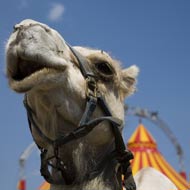Wales considers options for wild animal circus ban

‘Although there are no circuses based in Wales, they do visit and it is important the welfare needs of their animals are not overlooked.'
Welsh cabinet secretary Lesley Griffiths has confirmed she is “exploring opportunities” to bring forward a ban on wild animals in circuses.
Responding to the news yesterday (14 February), the RSPCA Cymru said it was “a momentous day for animals”. The charity believes circuses are inappropriate environments for wild animals, owing to their transient nature, cramped conditions and forced training.
In December last year, Scotland became the first country in the UK to pass a ban on wild animals in circuses. The Irish Government also introduced a ban which came into effect last month.
Ms Griffiths said in a statement: ‘Although there are no circuses based in Wales, they do visit and it is important the welfare needs of their animals are not overlooked. I am exploring opportunities to bring forward legislation to ban the use of wild animals in circuses in Wales.
‘I intend to learn from the recent scrutiny of the Wild Animals in Travelling Circuses (Scotland) Act 2018, particularly discussion of ethical and welfare arguments for a ban.’
RSPCA Cymru responded in a statement: “This ban makes a huge statement about how highly animal welfare is regarded in Wales, and how this country wants to treat our fellow living creatures. RSPCA Cymru will now work closely with the Welsh Government and all stakeholders to ensure this ban becomes a reality as soon as possible.”
The Welsh Government previously announced plans to bring in a licensing scheme for mobile animal exhibits (MAEs), which include travelling falconry and hawking displays, reindeer at Christmas events and mobile petting zoos, as well as travelling circuses.
RSPCA Cymru said it is “positive” that the government is pursuing such a scheme, as animals in MAEs “face unique and challenging lives, and deserve more protection”.
Welsh officials have been asked to explore the options available to ministers and a full consultation will be launched in 2018.



 The Animal and Plant Health Agency (APHA) has updated its online reporting service for dead wild birds.
The Animal and Plant Health Agency (APHA) has updated its online reporting service for dead wild birds.